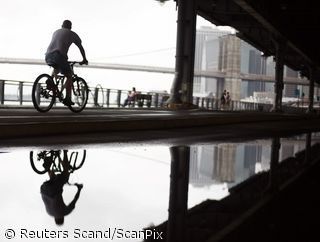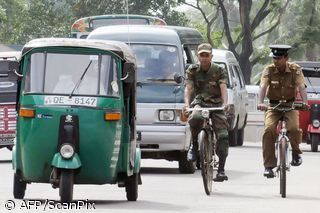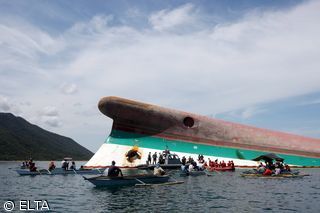Since 1993, the EU has provided the republic with 153 million euros (US $182 million) worth of humanitarian aid.
Published:
16 February 2005 y., Wednesday
Made up of an ethnic mix of Tajiks, Uzbeks and Russians, in 2004 Tajikistan experienced a further relative improvement in its overall humanitarian situation. International donor support remained strong - reaffirmed at a conference in London in February - but with a noticeable change of emphasis towards greater long-term development assistance to the mountainous nation and less on humanitarian aid.
Mirroring this trend, in May, the Humanitarian Aid Office of the European Commission (ECHO) reaffirmed its plans to scale back humanitarian activities in Tajikistan over the next three years. Since 1993, the EU has provided the republic with 153 million euros (US $182 million) worth of humanitarian aid.
But huge needs remain. Poverty has driven approximately 1 million Tajiks to seek better fortunes abroad, primarily in Russia. Over 83 percent of the population live below the national poverty line. A full 17 percent of the country's 6.3 million population is considered destitute. Food insecurity - particularly in rural areas - remains a key humanitarian issue.The education and healthcare systems continue to deteriorate, worsening the prospects for current and future generations.
The UN World Food Programme (WFP) continued to assist Tajikistan under its Protected Relief and Recovery Operation (PRRO), marking a transition from humanitarian relief to recovery and development in the country. "Tajikistan is a low-income and food-deficit country needing food assistance," the WFP country director, Ardag Meghdessian, told IRIN. "The shift of emphasis from relief to recovery indeed indicates increased stability in the country, as well as an improvement of the overall humanitarian situation," he said, adding that the devastating two-year drought in 2000 and 2001 was over.
Šaltinis:
irinnews.org
Copying, publishing, announcing any information from the News.lt portal without written permission of News.lt editorial office is prohibited.
The most popular articles
 Campaign for green transport underscores key role of cities in fighting global warming.
more »
Campaign for green transport underscores key role of cities in fighting global warming.
more »
 The EP has called for a rapid release of EU aid funds to help victims of this summer's devastating forest fires in Southern Europe, especially in Greece.
more »
The EP has called for a rapid release of EU aid funds to help victims of this summer's devastating forest fires in Southern Europe, especially in Greece.
more »
 Taking into account changes on domestic and international money markets AB DnB NORD Bankas, a member of international financial group shall change individual and corporate time deposit rates from September 14th.
more »
Taking into account changes on domestic and international money markets AB DnB NORD Bankas, a member of international financial group shall change individual and corporate time deposit rates from September 14th.
more »
 The World Bank today approved a US$75 million IDA credit to Sri Lanka, which will support the second phase of a community driven development program that has touched the lives of nearly one million poor Sri Lankans in the three provinces of Uva, Southern, and Sabaragamuwa.
more »
The World Bank today approved a US$75 million IDA credit to Sri Lanka, which will support the second phase of a community driven development program that has touched the lives of nearly one million poor Sri Lankans in the three provinces of Uva, Southern, and Sabaragamuwa.
more »
 The lights went out on the traditional 100 watt bulb on 1 September as new EU rules on energy efficiency kicked in.
more »
The lights went out on the traditional 100 watt bulb on 1 September as new EU rules on energy efficiency kicked in.
more »
 EU seeks new tools for measuring economic performance that give more weight to social and environmental aspects of wellbeing.
more »
EU seeks new tools for measuring economic performance that give more weight to social and environmental aspects of wellbeing.
more »
 Samoa is to become the first nation in nearly 40 years to swap driving on the right side of the road, to the left.
more »
Samoa is to become the first nation in nearly 40 years to swap driving on the right side of the road, to the left.
more »
 Tales of survival are beginning to emerge among passengers plucked from a sinking ferry off the southern Philippines.
more »
Tales of survival are beginning to emerge among passengers plucked from a sinking ferry off the southern Philippines.
more »
 Taking into account changes on domestic money market AB DnB NORD Bankas, a member of international financial group shall change individual and corporate time deposit rates as of 1st September.
more »
Taking into account changes on domestic money market AB DnB NORD Bankas, a member of international financial group shall change individual and corporate time deposit rates as of 1st September.
more »
 Proposal for programme to coordinate resettlement of refugees at the EU level.
more »
Proposal for programme to coordinate resettlement of refugees at the EU level.
more »